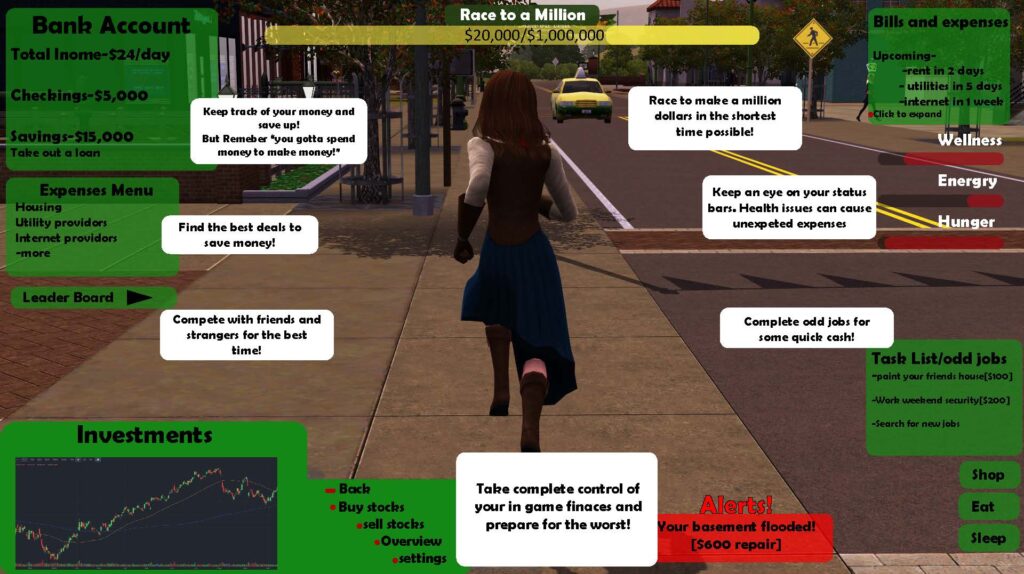As I began to dive into research on Personal Finance and well-being and where to focus, I had a suspicion about the financial literacy level of college students entering the workforce as well as how much time this generation (Gen Z) spends playing video games. I’ve noticed that people are willing to spend a significant amount of time and energy learning minutiae details about video games. However, when it comes to real-world knowledge about your finances or even just studying for classes people are reluctant. So I started to ask myself, what is it about games that make people want to spend so much energy (sometimes more than they would for school/study) to learn and master them?
First things first I needed to confirm my suspicions. Is Gen Z lacking in financial literacy? What even is financial literacy? Let’s define financial literacy before I go on, “Financial literacy involves grasping and utilizing concepts such as budgeting, saving, investing, and managing credit effectively”(Grant, Tiffany). Gen Z students are coming out of college with a significant lack of understanding of how to manage their finances. As of early 2024, “only 50% or less of young adults aged 18-27 are considered financially literate, as revealed by a survey from the Global Financial Literacy Excellence Center. A survey conducted by the Financial Industry Regulatory Authority (FINRA) found that merely 24% of Gen Z respondents could correctly answer four out of five basic financial literacy questions”(Grant, Tiffany). Why does this matter? A lack of understanding of basic financial principles can lead to people feeling financially unwell. So what does financial well-being look like? UnitedHealthcare defines it as “a state of being wherein a person can fully meet current and ongoing financial obligations, can feel secure in their financial future, and can make choices that allow them to enjoy life”(Financial Well-Being).
Now that I’ve determined that there is a lack of financial literacy among Gen Z, what about my other suspicion? How much time and energy is Gen Z spending on video games? According to a survey done by Zoi Walker, surveying Americans from ages 16 to 54, 30% of respondents reported playing video games for 10 hours per week. That’s 20 days per year and about 3 and a half years per lifetime. Reported by that same survey “68% of Americans play video games regularly, as opposed to “sometimes” or “never.” Gen Z clocks the highest percentage of regular gamers (73%)” (Walker, Zoi). Something I found interesting was that “Gen Z, with the largest share (31%) saying they play because they’re “obsessed”—it’s one of their favorite pastimes” (Walker, Zoi). A large portion of Gen Z is “obsessed” with gaming. Could their time be better spent? Maybe, but given that Gen Z already spends so much time gaming where can design interject into that?

So far I’ve outlined that Gen Z lacks financial literacy and that Gen Z spends a lot of time playing video games. What my research hopes to explore is how gamification can be utilized to help educate Gen Z to become more financially literate. So let’s take a look at what gamification is and how video games can be used to educate.
Gamification can be defined as “the application of game-design elements and game principles in non-game contexts. It can also be defined as a set of activities and processes to solve problems by using or applying the characteristics of game elements” (Make a Video Game in Minutes Not Months). The tactic of gamification is no new strategy. Gamification is being used in many areas today like in businesses, marketing, health, and even in education. Continually gamification proves itself to be a useful and successful tool. A notable example would be Duolingo. Alex Bresler, in an article about how successful Duolingo is, says “These new narrative exercises achieved something no textbook I’ve thumbed has been able to accomplish”(Bresler, Alex). Can a method similar to DuoLingo be used to teach about finances? With that question in mind, I designed a rough concept of what that might look like and how that might work.

The hope for that concept was to gamify short financial lessons but gamification isn’t even new to finance. There are many services out there that take advantage of this. For example, Robinhood offers a commission-free stock trading app that has become fairly successful. This leads me to where I think gamification in finance is failing.
Sam Liberty, a game design professor at Northeastern University, has a very interesting insight into this topic. When talking to his students about incorporating Crypto into the game designs he had this to say;
Whenever you add financial gain into a system, you instantly pervert the incentives of that system, tipping them toward the material. It seems like a no-brainer that a gamer would like the awesome gun or skin they purchased to become insanely valuable, too. This way, they can play a fun game and instead of paying for the privilege, get paid. The lure of money would draw in more players to enhance the community and everyone’s profits. It’s a win-win-win.But then in practice, the opposite is true. Players want to play games to escape from real life and experience moments of delight and joy, not to make money. If they wanted to earn money, they would work or invest, in activities that can also be rewarding in their own right(Liberty, Sam).
Using gamification tied directly to real-world money with the real risk I think is where it fails. I believe gamification can be used in a simulated environment to educate complex topics of finance. Gen Z is willing and capable of learning about finances there just seems to be a lack of appealing resources to do so. I see this in games like CityScapes, Civilisation, and Eve Online. People learn and spend a lot of time building useful and practical skills in these games. As part of my primary research, I was interviewing a student here at OSU and I asked what his favorite part of CityScape was (A game he said he enjoyed). He said, “getting into and learning the nitty-gritty details of road planning”. On the surface level, a game about road planning does not sound fun. Yet CityScapes has thousands of players. What is it about learning minutiae and complicated gameplay that is so appealing?
In another interview I conducted a student said “I have learned more about economics from Civilization 5 (CIV) than any other college-level course I’ve taken.” When asked, what it was about learning economics in CIV that was so appealing? He said, “The game gives me a sense of ownership when things go well, there’s a lot of trial and error in the game so when it works I feel accomplished”. These are just a few examples of games that make learning about complex topics fun and appealing. How can design use these strategies when trying to educate about finance? Inspired by these interviews and these games I set out to design a game concept that would have a similar draw. In my interviews, both people reported being more attracted to a game the more complex it was. The more details and features a game has to deep dive into the better. This is a concept I call “Race to a Million”. The goal is to earn a million dollars in the shortest time possible. Every financial decision that could be made in real life would be available in-game. Players would be free to explore financial strategies with zero risk involved.

This concept is a tad silly and maybe far-fetched but I think it gets to the heart of what I’ve been trying to say about the approach to gamification of financial literacy. Not only is it possible to communicate complex knowledge through games but also when done successfully it’s appealing to Gen Z.
There seems to be a gap here that I believe financial institutions and banks could be able to fill. There’s a lot of misleading advice out there about finances and classical education doesn’t seem to be doing enough to make sure Gen Z students are financially literate. Given that Gen Z students are coming out of college financially illiterate and given the fact that Gen Z spends a lot of time playing video games. How can financial institutions and banks use gamification tactics to educate Gen Z so they feel confident in their finances?
Sources
Grant, Tiffany. “Financial Literacy for Generation Z: Why It Matters and How to Improve It.” Money Talk With Tiff, 18 Mar. 2024, moneytalkwitht.com/blog/gen-z-financial-literacy/.
“Financial Well-Being.” Financial Well-Being | UnitedHealthcare, UnitedHealthcare, www.uhc.com/health-and-wellness/health-topics/financial-well-being. Accessed 9 Sept. 2024.
Walker, Zoi. “How Much Time Do Americans Spend Gaming?: Centurylinkquote.” Find CenturyLink Internet, TV, Phone Services Information, 3 Sept. 2024, www.centurylinkquote.com/resources/time-spent-gaming#:~:text=Today%2C%20there’s%20a%20growing%20consensus,who%20once%20questioned%20its%20value.
Bresler, Alex. “Does Duolingo Actually Work? I Went to Belgium after a 90-Day Lesson Streak to Find Out.” Matador Network, Matador Network, 21 Dec. 2022, matadornetwork.com/read/does-duolingo-actually-work/.
Liberty, Sam. “Why Crypto Games Will Never Be a Thing.” Medium, Medium, 4 Feb. 2024, sa-liberty.medium.com/why-crypto-games-will-never-be-a-thing-1a7b8b1dad8b.




